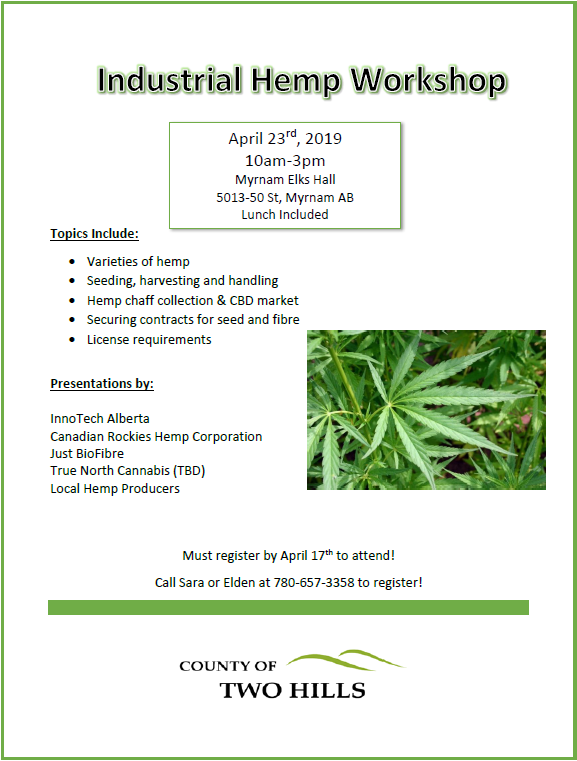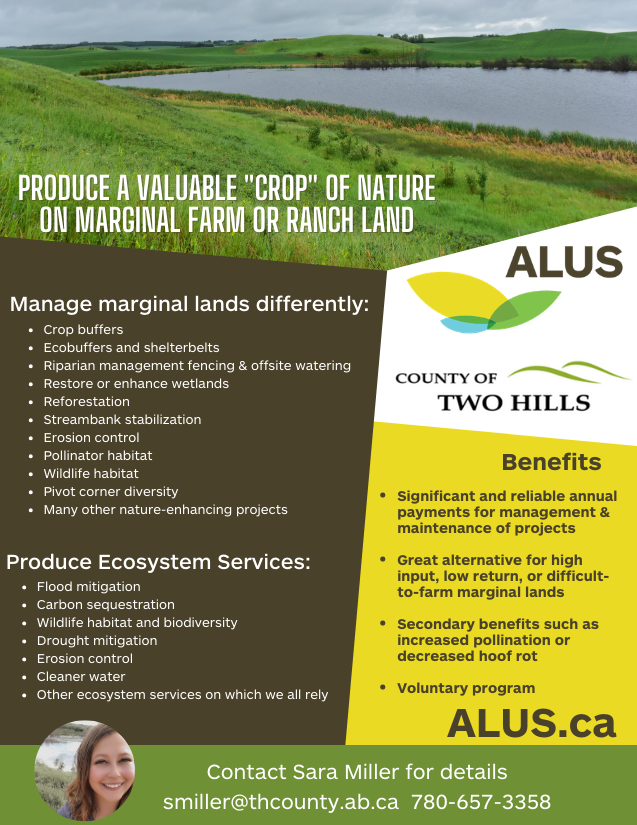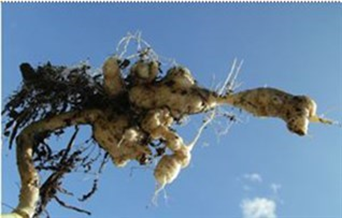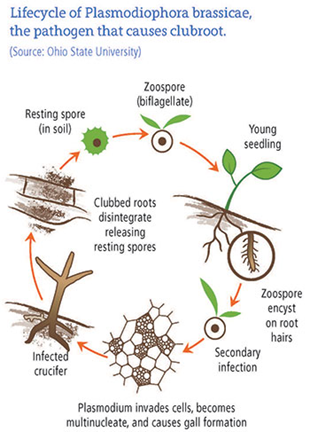Roadside Mowing
The County of Two Hills # 21 Agricultural Service Board will be starting their Roadside Mowing Program along municipal roads.
The program will consist of mowing all road allowances with up to a 15 foot cut from the shoulder into the ditch. Persons wishing to cut hay on the road allowance must complete all cutting prior to the mowers arrival. If hay has been cut and is in swath, mowers will go around that particular swath. However all standing grass will be mowed with absolutely no exceptions.
Mowing will not take place before July 20, 2019.
For more information, contact the Agricultural Service Board Office at 657-3358.
 ]]>
]]> ]]>
]]>
June 11, 2019
Lamont Ag Society Grounds
Time: 11:30 am
Agenda
- Registration and Lunch
- Stock Dog Demonstration
- Horse Farrier & Dentistry Demonstration
- Long Table Dinner & Social
- Sustainable Beef
June 12, 2019
St. Michael Hall
Time: 7:30 am
Agenda
- Breakfast and Registration
- Plant Identification: Learn to identify range and riparian plants found in Central Alberta
- Soil Characteristics
- Cattle Nutrition
- Rural Crime Prevention
Registration Options
- Day 1 only $45
- Day 2 only $45
- Both days $80
Registration Deadline: May 31, 2019
Registration may be made by:
Phone: Linda at 780-603-3486
Email: lindagrazingschool@gmail.com
Online: grazingschool4women.com
For more information, click here.
To view the poster, click here.
Workshops
No Advertised Workshops at this time
]]>
Producer Sponsorship
The Agricultural Service Board will sponsor a number of local producers by providing paid registrations and accommodations to attend conferences that provide the latest information and developments in the Agriculture/Environmental Industry, which producers can apply to their own operation. Only one member of the farm operation will be eligible to attend one of the following conferences:
Agronomy Update
January 15-16, 2019
Lethbridge AB
FarmTech
January 29-31, 2019
Edmonton Northlands
Agri-Visions
February 13-14, 2019
Lloydminster AB
Alberta Beef Industry Conference
March 12-14, 2019
Red Deer AB
For further information, contact the ASB Department at 780-657-3358. Application forms are available at the County Office or click here. Applications must be submitted to the ASB Department on or before January 4, 2019.
In person: 4818 50 Avenue
Two Hills AB
By mail: PO Box 490
Two Hills AB T0B 4K0
By fax: 780-657-3504
By email: smiller@thcounty.ab.ca
ekozak@thcounty.ab.ca
Agricultural Programs
INTEGRATED VEGETATION MANAGEMENT
Information on weed control and common weeds, roadside spraying and mowing programs. For more information on any of these programs please contact the ASB Department.
Roadside Spraying and Mowing
The ASB Department uses roadside spraying to control noxious weeds and brush re-growth. Spraying is conducted on a three-year rotation along municipal roads. Mowing is conducted to control roadside vegetation as well.
For more information on this year's Roadside Mowing Program, click here.
No Spray
Landowners who do not wish to have the ditches adjacent to their property sprayed must sign an Annual No Spray Agreement. This agreement states that the landowner accepts responsibility for control of weeds in the ditch. No Spray signs can be issued. Failure to control weeds may result in the County controlling them by whichever means they deem appropriate.
No Spray agreements are the landowner’s responsibility to renew each year. Please contact the ASB Department for more information or to sign a No Spray Agreement.
Weed Control & Common Weeds
It requires a collective effort to control the spread of noxious weeds. Control work by landowners is a crucial component to control and is one of the most effective ways to slow the spread of these plants. Under the Weed Control Act, the County may issue a Weed Notice for uncontrolled weeds.
For more information, click here.
PEST CONTROL PROGRAMS
Information on clubroot, fusarium, coyote program, beaver control, and other pest issues.
Clubroot
The County of Two Hills No. 21 Clubroot Policy is intended to assist in the control and spread of clubroot of crucifers in the municipality. Random inspections will be conducted by the Agricultural Fieldman, Assistant Agricultural Fieldman or by an appointed inspector. Positive identification of clubroot will be obtained by a laboratory test. Landowners will be notified in writing if their land tests positive and a Pest Notice will be issued.
For more information, click here.
Predation Control
Coyote control may be carreid out on a complaint basis only with a Pest Control Officer investigating all livestock damage claims. Control methods will be used at the discretion of the Pest Control Officer.
Coyote Reduction Incentive Program
The County of Two Hills No. 21 will pay an incentive per coyote killed during the period of November 1, 2018 to April 30, 2019 (deadline subject to budget limitations and/or abuse of the program). The number of coyotes eligible to be turned in for incentive payment will be limited to a maximum of 40 coyotes per residence (limited to one member per residence).
For more information, click here.
Beaver Control
The County of Two Hills No. 21 may remove beaver dams to protect municipal infrastructure (such as roads). Dam removal on private lands will have fees associated with it. Please contact the ASB Department if you have beaver concerns.
Richardson Ground Squirrel (Gopher) Control
2% Strychnine is available for qualified farmers within the County of Two Hills. Please contact the ASB Department to make arrangements for purchase of Strychnine.
Skunks, Raccoons, Magpies and Other Pests
The County of Two Hills No. 21 has Skunk, Racoon and Magpie traps available for purchase (see the Equipment Rental List for pricing). You may also rent skunk and racoon traps as well as scare cannons from the ASB Department. Please contact the ASB Department to make arrangements.
Environmental Programs
ALUS Canada

ALUS Canada is a national not-for-profit organization that supports the delivery of the ALUS program across the country.
Ecosystem Services
Active in six provinces to date, the ALUS program works with farmers and ranchers to produce valuable ecological services on Canadian farmland.
These ecological services include clean air, clean water, flood mitigation, climate adaptation, carbon sequestration, species at risk habitat and support for our native bees and pollinators.
Projects
Specifically, ALUS helps farmers and ranchers restore wetlands, reforest, plant windbreaks, install riparian buffers, manage sustainable drainage systems, create pollinator habitat and establish other ecologically beneficial projects on their properties.
ALUS provides annual payments to its participants to ensure the ongoing stewardship of each of their ALUS projects.
Partners
For over a decade now, ALUS Canada has been building excellent relationships within agricultural communities while perfecting its unique mechanism for delivering conservation outcomes from Canada’s rural acres.
Thanks to the generous commitment of The W. Garfield Weston Foundation and other dedicated supporters, ALUS Canada is rapidly expanding into many new communities across the country.
Results
In this way, ALUS turns marginal farmland into productive ecosystems, linking Canada’s natural heritage across agricultural lands.
For more information on the ALUS program, please contact your local program coordinator, or the team at ALUS Canada
MISSION STATEMENT
ALUS Canada’s mission is to enable Canadians to provide direct support to a national network of farmers and ranchers delivering ecosystem services in their communities, including cleaner air, cleaner water, carbon sequestration, erosion control, flood mitigation, pollinator support and wildlife habitat.
VISION STATEMENT
Community-developed and farmer-delivered, ALUS sustains agriculture, wildlife and natural spaces for all Canadians, one acre at a time.
STATEMENT OF PRINCIPLES
The ALUS Canada program rests firmly on eight core principles:
- ALUS is farmer-delivered: As the largest single group of landowners in Canada, agricultural producers are in a unique position to provide important solutions to some of the most pressing conservation challenges of our time, including climate change and biodiversity loss.
- ALUS is community-developed: The ALUS program is flexible, designed to be customized by local communities to respect local agricultural and environmental priorities. From Red Deer, Alberta, to Saint-Hyacinthe, Quebec, each ALUS program is managed by a local ALUS Coordinator and a Partnership Advisory Committee (PAC), which is made up of agricultural producers and such local stakeholders as municipalities, conservation groups, farm associations and government agencies. In every ALUS community, it is the local PAC that determines how the local ALUS program will be run—within the tried, tested and true framework of ALUS Canada’s principles, guidelines and materials.
- ALUS is integrated: The delivery of the ALUS program is intended to complement existing conservation programs, including federal and provincial government policy frameworks. ALUS programs across the country have developed many community partnerships with conservation organizations, agricultural groups and different levels of government.
- ALUS is targeted: The program focuses on marginal and ecologically sensitive parcels of land that can be managed in a different manner to produce ecosystem services that benefit all Canadians.
- ALUS is accountable: ALUS projects are independently monitored, verified and audited.
- ALUS is science-based: Based on sound scientific principles and verification guidelines, ALUS provides valuable support and technical expertise for the design and implementation of each green infrastructure project.
- ALUS is voluntary: Farmers and ranchers who choose to participate in the ALUS program have flexible agreements that suit their particular operation.
- ALUS is market-driven: The ecosystem services produced by ALUS projects have economic value on the marketplace, one that ALUS Canada is actively developing. Through ALUS Canada, citizens, corporations and philanthropists can invest directly in Canadian environmental stewardship, one acre at a time.
For more information, please contact your local ALUS program coordinator, or the team at ALUS Canada.
https://alus.ca/alus_community/alus-two-hills/
Alberta Environmental Farm Plan
The Environmental Farm Plan (EFP) is a voluntary, whole farm, self-assessment tool that helps producers identify their environmental risks and develop plans to mitigate identified risks. Over 9,000 Alberta producers have demonstrated their commitment to environmental stewardship by completing an EFP.
An EFP helps you to identify what you are already doing well, and pinpoint areas needing improvement. It is a great tool for identifying and planning projects to improve environmental stewardship on-farm. Depending on your farm, you can typically complete an EFP in 1-2 days, and once your EFP is approved you become eligible for funding under the Canadian Agricultural Partnership (CAP) Environmental Sustainability and Climate Change programs.
Late fall and through the winter is a great time to work on your EFP and start planning projects (but EFPs can be done at anytime). For more information on the EFP program, or for assistance with beginning, finishing or renewing your EFP please contact our Municipal Conservation Coordinator.
Note: Effective April 1, 2018, producers who have an EFP older than 10 years will have to renew their EFP to be eligible for funding under the Canadian Agricultural Partnership Program (CAP). Producers who have not completed an EFP or who completed one prior to 2008 should renew now to ensure eligibility.

Canadian Agricultural Partnership (CAP)
The Canadian Agricultural Partnership is a five-year, $3 billion federal-provincial-territorial investment in the agriculture, agri-food and agri-based products sector that began in April 2018, and is the successor of the 2013-18 Growing Forward 2 partnership. In Alberta, the Canadian Agricultural Partnership represents a federal-provincial investment of $406 million in strategic programs and initiatives for the agricultural sector. 15 programs will be rolled out in total, with all programs set to be open by the end of 2018.
In Alberta, the Canadian Agricultural Partnership will deliver programs developed in consultation with stakeholders, and is organized under five themes: Environmental Sustainability and Climate Change; Products, Market Growth and Diversification; Science and Research; Risk Management; and Public Trust.
To stay up to date on all the programs make sure to “Subscribe to Receive Program Announcements” on the CAP website (www.cap.alberta.ca). For more information or assistance with applications please contact our Municipal Conservation Coordinator.

Farm Energy and Agri-Processing Program (FEAP)
The Farm Energy and Agri-Processing Program shares costs with the agriculture and agri-processsing sector on energy efficiency investments. The program is designed to encourage energy management which will result in cost savings, energy conservation, and ultimately, reduced greenhouse gas emissions.
The program offers finanical support to applicants who incorporate high efficiency equipment that is identified in the applicable funding list in their construction and/or retrofitting projects.
Examples of items eligible under this program include:
- Energy audits and assessments
- Electricity, natural gas, and liquid submeters
- New construction insulation
- Lighting (LED lighting for greenhouses, luminaires, etc.)
- Heating (boilers, furnaces, etc.)
- Ventilation
- Energy-free and low energy livestock waters, etc.
The full funding lists can be accessed below:
Visit www.agriculture.alberta.ca/feap for more information.

On-Farm Solar Photovoltaics Program
The On-Farm Solar Photovoltaics Program provides funding towards solar photovoltaics on Alberta farms. This enables producers to conserve non-renewable fossil fuels and reduce carbon emissions, ultimately reducing the environmental footprint of Alberta’s agriculture industry.
To be eligible for funding, a Photovoltaic system must be:
- Grid-tied, not off-grid
- Approved under Alberta’s Micro-Generation Legislation
- Positioned to optimize sunshine and minimize shading
- Have manufacturer-warranties on: Solar modules, Racking, Inverters and/or Mirco-inverters
- Installed on a Site ID that has a Distribution Rate Class of Farm, Irrigation, Grain Drying or equivalent
Funding is retroactively available for projects that have been completed AFTER APRIL 15, 2017.
Visit www.agriculture.alberta.ca/solar for more information.
Shelterbelts
Listed below are private suppliers of shelterbelt trees. This list is provided for information only; the County does not work directly with any of these suppliers.
- Prairie Shelterbelt Program (Sundre, AB)
- HELP International (Weyburn, SK)
- Tree Time (Edmonton, AB)
- Prairie Tech Propagation (Bonnyville, AB)
- Boreal Horticultural Services (Bonnyville, AB)
]]>

The County of Two Hills No. 21 Clubroot Policy is intended to assist in the control and spread of clubroot of crucifers in the municipality. Random inspections will be conducted by the Agricultural Fieldman, Assistant Agricultural Fieldman or by an Inspector appointed by the County of Two Hills. Positive identification of clubroot will be obtained by a laboratory test.
Landowners will be notified in writing if their land tests positive and a Pest Notice will be issued.
To learn where Clubroot has been found in the County of Two Hills download the maps below:
- Clubroot Positives Map (2014-2017)
- 2018 Clubroot Testing Map
- 2017 Clubroot Testing Map
- 2016 Clubroot Testing Map
- 2015 Clubroot Testing Map
- 2014 Clubroot Testing Map
Individual fields that have tested positive for clubroot in the county are listed below. The year the Pest Notice becomes inactive is in parenthesis.
2020 Clubroot Positive Fields (2024)
NW 1-54-13W4
NE 26-53-13W4
SW 26-55-12W4
2019 Clubroot Positive Fields (2023)
SE 16-53-12 W4
SW 15-53-12 W4
SW 27-56-12 W4
NW 27-56-12 W4
SW 18-54-14 W4
NW 18-54-14 W4
SW 8-55-15 W4
S ½ of SW 18-55-15 W4
SE 33-54-13 W4
NE 31-53-9 W4
S ½ of NW 4-54-13 W4
SE 16-55-12 W4
2018 Clubroot Positive Fields (2022)
NE 31-53-13 W4
NW 5-54-13 W4
SE 14-56-13 W4
SW 31-53-13 W4
SW 28-53-13 W4
SE 31-53-13 W4
SE 29-53-13 W4
SW 34-54-13 W4
NW 27-54-13 W4
SW 15-54-13 W4
SE 30-53-13 W4
NE 30-53-13 W4
NW 10-54-13 W4
SE 21-53-12 W4
NE 36-55-12 W4
NW 36-55-12 W4
NW 11-55-12 W4
SE 25-53-10 W4
SW 10-53-9 W4
NW 10-53-9 W4
2017 Clubroot Positive Fields (2021)
NW 21-56-15 W4
SW 9-57-15 W4
NW 14-53-12 W4
SW 23-53-12 W4
SW 15-53-12 W4
SE 16-53-12 W4
NW 10-53-12 W4
SE 2-56-15 W4
2016 Clubroot Positive Fields (2020)
NW 3-54-13 W4
NW 33-53-13 W4
NW 32-53-13 W4
NW 5-54-13 W4
NE 31-53-13 W4
2015 Clubroot Positive Fields (2019)
SW 7-55-14 W4
SW 4-57-15 W4
NW 11-56-12 W4
SW 4-54-13 W4
NE 33-53-13 W4 (retest)
2014 Clubroot Positive Fields (2018)
NE 33-53-13 W4
WHAT IS CLUBROOT?
Clubroot is a serious soil-borne disease of cruciferous crops such as:
- Canola and mustard crops
- Vegetable crops such as broccoli, cauliflower, brussel sprouts, cabbage, radish, kohlrabi, turnip and kale
- Weeds such as wild mustard, stink weed and sheperd’s purse
Clubroot is caused by the pathogen Plasmodiophora brassicae which infects the roots of susceptible crops. In canola, it causes swellings or galls to form on the roots. Infection at the seedling stage can result in wilting, stunting and yellowing symptoms by the late rosette to early podding stage, while premature ripening or death can be observed in plants nearing maturity. Plants infected at later growth stages may not show wilting, stunting or yellowing, but may still ripen prematurely, and seeds may shrivel, thus reducing yield and quality. At the end of the season, the galls break down into the soil releasing millions of new spores and the cycle continues.

Currently, there are no economical control measures that can remove this pathogen from a field once it has become infested. Preventing the spread of clubroot spores through contaminated soil movement is critical to managing this disease.
Clubroot spores move readily with any soil movement. The primary mode of transportation is field-to-field by contaminated equipment. It can also move through wind, water, soil erosion and animals.
Clubroot spores can live in the soil for up to 20 years. The half-life of these spores is about four years - after four years, if there is no host available, half of the spores will no longer be viable. Tight canola rotations (1 in 2 year) allow for quick development of the disease once it has been introduced in the soil. Long rotations (1 in 4) are recommended to prevent disease development and to protect the breakdown of resistant traits in clubroot resistant canola varieties.
BEST MANAGEMENT PRACTICES
The following management practices are recommended in the Alberta Clubroot Management Plan:
- Use clubroot-resistant varieties in areas known to have clubroot.
- Use long crop rotations (three or more years) between canola crops to reduce disease severity and reduce other crop diseases. Fields with confirmed clubroot should use resistant varieties and follow crop rotation practices of one canola crop every four years. Note: Crop rotation will not eradicate the clubroot pathogen from the soil.
- Control volunteer canola and cruciferous weeds to prevent spore production on host plants.
- Practice good sanitation (cleaning and disinfection) of machinery and equipment, to restrict the movement of potentially contaminated soil.
- Seed and establish an area with grass near the field exit. A grass area will retain soil removed from equipment during cleaning.
- Implement soil conservation practices including minimizing tillage and using direct seeding as spores can move with wind and soil erosion.
- Minimize traffic in fields, especially during wet conditions. Discourage recreational vehicles from entering land.
- Fields with light infestations in the entrance can create a new vehicle approach at another edge of the field.
- Scout fields regularly and identify causes of wilting, stunting, yellowing and premature ripening.
- Avoid using straw, hay, manure and silage from areas known or suspected of clubroot. Clubroot spores may survive through the digestive tracts of livestock.
- Avoid common untreated seed (including canola, cereals and pulses). Earth tag on seed from infested fields could introduce spores to clean fields.
FURTHER INFORMATION
Alberta Clubroot Management Plan
Canola Council of Canada-Clubroot
]]>
